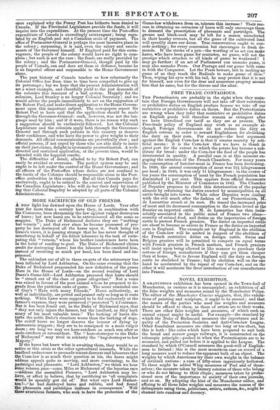FREE TRADE CONTAGIOUS.
THE Protectionists are probably in the right when they main- tain that Foreign Governments will not take off their restrictive or prohibitive duties on English produce because we take off our restrictive or prohibitive duties on theirs. But the Protectionists are wrong when they infer that restrictive or prohibitive duties on English goods will therefore remain as stringent after we have liberalized our tariff as they are at present. The Free-trade policy of England may work as an example al- though Foreign Governments do not reduce the duty on English cottons in order to reward Englishmen for abolishing the duty on their corn. For example—the best argument against the English Corn-law is that it creates scarcity by arti- ficial means : it is the Corn-law that we have to thank in great part for the extent to which the potato has become a sub- stitute for bread : under the Corn-law the food of the people has deteriorated in quality-. A parallel case is at this moment en- gaging the attention of the French Chambers. For many years the consumption of butcher-meat in France has been decreasing. In 1830_, the annual consumption of meat was 12f kilogrammes per head ; in 1840, it was only 11 kilogrammes: in the course of ten years the consumption of meat by the French population has diminished 11 per cent. This appears from official documents published by the Minister of Commerce in 1842. The Chamber of Deputies proposes to check this deterioration of the popular aliment by reforming the duties exacted by municipalities on all cattle brought into towns. While other Deputies were dealing with the evil much after the fashion of our Protectionists, 111. de Lamartine struck at its root. He traced the increased price of meat and its decreased consumption to the duties levied at the frontier on imported cattle. M. de Lamartine has thus indis- solubly associated in the public mind of France two ideas— scarcity of animal food, and duties on the importation of foreign cattle to protect French graziers. The duties on imported cattle are about to become as odious in France as the duties on imported corn in England. The example set by England in the abolition of the Corn-law will be quoted in support of the abolition of the French restrictive duties on foreign cattle. Swiss and Belgian graziers will be permitted to compete on equal terms with French graziers in French markets, and French graziers will insist upon being allowed in like manner to purchase their cottons of foreign manufacture if they can get them cheaper than at home. Not to favour England will the duty on foreign cattle be abolished in France ; but its abolition will on the one hand be accelerated by the repeal of our Corn-law, and on the other it will accelerate the freer introduction of our manufactures into France.


























 Previous page
Previous page